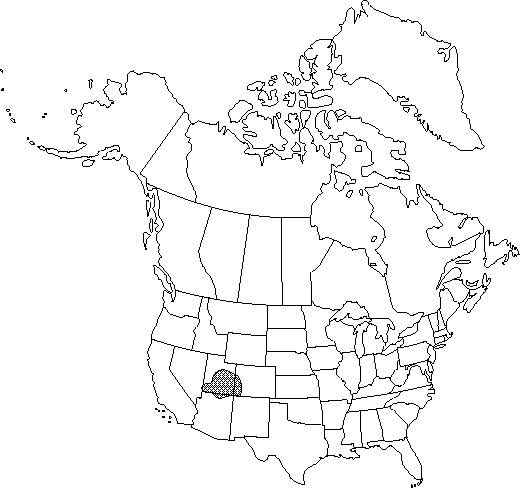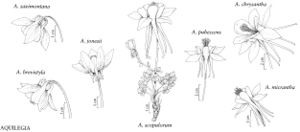Difference between revisions of "Aquilegia micrantha"
Proc. Calif. Acad. Sci., ser. 2, 4: 559-560, plate 19. 1895.
EndemicIllustrated
Synonyms: Aquilegia flavescens var. rubicunda (Tidestrom) S. L. Welsh Aquilegia micrantha var. mancosana Eastwood
Treatment appears in FNA Volume 3.
FNA>Volume Importer |
imported>Volume Importer |
||
| (7 intermediate revisions by 2 users not shown) | |||
| Line 12: | Line 12: | ||
}}{{Treatment/ID/Special_status | }}{{Treatment/ID/Special_status | ||
|code=F | |code=F | ||
| − | |label= | + | |label=Illustrated |
}} | }} | ||
|basionyms= | |basionyms= | ||
| Line 18: | Line 18: | ||
|name=Aquilegia flavescens var. rubicunda | |name=Aquilegia flavescens var. rubicunda | ||
|authority=(Tidestrom) S. L. Welsh | |authority=(Tidestrom) S. L. Welsh | ||
| − | }}{{Treatment/ID/Synonym | + | |rank=variety |
| + | }} {{Treatment/ID/Synonym | ||
|name=Aquilegia micrantha var. mancosana | |name=Aquilegia micrantha var. mancosana | ||
|authority=Eastwood | |authority=Eastwood | ||
| + | |rank=variety | ||
}} | }} | ||
|hierarchy=Ranunculaceae;Aquilegia;Aquilegia micrantha | |hierarchy=Ranunculaceae;Aquilegia;Aquilegia micrantha | ||
| Line 29: | Line 31: | ||
}}<!-- | }}<!-- | ||
| − | --><span class="statement" id="st- | + | --><span class="statement" id="st-undefined" data-properties=""><b>Stems </b>30-60 cm. <b>Basal</b> leaves 2-3×-ternately compound, 10-35 cm, much shorter than stems; leaflets green adaxially, to 13-32 mm, viscid; primary petiolules 21-64 mm (leaflets not crowded), glandular-pubescent or glandular. <b>Flowers</b> erect or nodding; sepals perpendicular to floral axis, white, cream, blue, or pink, oblong-lanceolate, 8-20 × 3-6 mm, apex acuminate to obtuse; petals: spurs white or colored like sepals, straight, ± parallel or divergent, 15-30 mm, slender, evenly tapered from base or occasionally ± abruptly narrowed near middle, blades white or cream, oblong, 6-10 × 3-7 mm; stamens 9-14 mm. <b>Follicles</b> 10-20 mm; beak 8-10 mm.</span><!-- |
-->{{Treatment/Body | -->{{Treatment/Body | ||
| Line 44: | Line 46: | ||
-->{{#Taxon: | -->{{#Taxon: | ||
name=Aquilegia micrantha | name=Aquilegia micrantha | ||
| − | |||
|authority=Eastwood | |authority=Eastwood | ||
|rank=species | |rank=species | ||
| Line 54: | Line 55: | ||
|habitat=Seepy rock walls of canyons | |habitat=Seepy rock walls of canyons | ||
|illustrator=Bee F. Gunn | |illustrator=Bee F. Gunn | ||
| + | |illustration copyright=Flora of North America Association | ||
|elevation=1000-2500 m | |elevation=1000-2500 m | ||
|distribution=Ariz.;Colo.;Utah. | |distribution=Ariz.;Colo.;Utah. | ||
| Line 59: | Line 61: | ||
|publication title=Proc. Calif. Acad. Sci., ser. | |publication title=Proc. Calif. Acad. Sci., ser. | ||
|publication year=1895 | |publication year=1895 | ||
| − | |special status=Endemic; | + | |special status=Endemic;Illustrated |
| − | |source xml=https:// | + | |source xml=https://bitbucket.org/aafc-mbb/fna-data-curation/src/2e0870ddd59836b60bcf96646a41e87ea5a5943a/coarse_grained_fna_xml/V3/V3_75.xml |
|genus=Aquilegia | |genus=Aquilegia | ||
|species=Aquilegia micrantha | |species=Aquilegia micrantha | ||
| − | |||
| − | |||
| − | |||
| − | |||
| − | |||
| − | |||
| − | |||
| − | |||
| − | |||
| − | |||
| − | |||
| − | |||
| − | |||
| − | |||
| − | |||
| − | |||
| − | |||
| − | |||
| − | |||
| − | |||
| − | |||
| − | |||
| − | |||
| − | |||
| − | |||
| − | |||
| − | |||
| − | |||
| − | |||
| − | |||
}}<!-- | }}<!-- | ||
-->[[Category:Treatment]][[Category:Aquilegia]] | -->[[Category:Treatment]][[Category:Aquilegia]] | ||
Latest revision as of 21:51, 5 November 2020
Stems 30-60 cm. Basal leaves 2-3×-ternately compound, 10-35 cm, much shorter than stems; leaflets green adaxially, to 13-32 mm, viscid; primary petiolules 21-64 mm (leaflets not crowded), glandular-pubescent or glandular. Flowers erect or nodding; sepals perpendicular to floral axis, white, cream, blue, or pink, oblong-lanceolate, 8-20 × 3-6 mm, apex acuminate to obtuse; petals: spurs white or colored like sepals, straight, ± parallel or divergent, 15-30 mm, slender, evenly tapered from base or occasionally ± abruptly narrowed near middle, blades white or cream, oblong, 6-10 × 3-7 mm; stamens 9-14 mm. Follicles 10-20 mm; beak 8-10 mm.
Phenology: Flowering spring–summer (Apr–Sep).
Habitat: Seepy rock walls of canyons
Elevation: 1000-2500 m
Distribution

Ariz., Colo., Utah.
Discussion
Selected References
None.
Lower Taxa
None.
